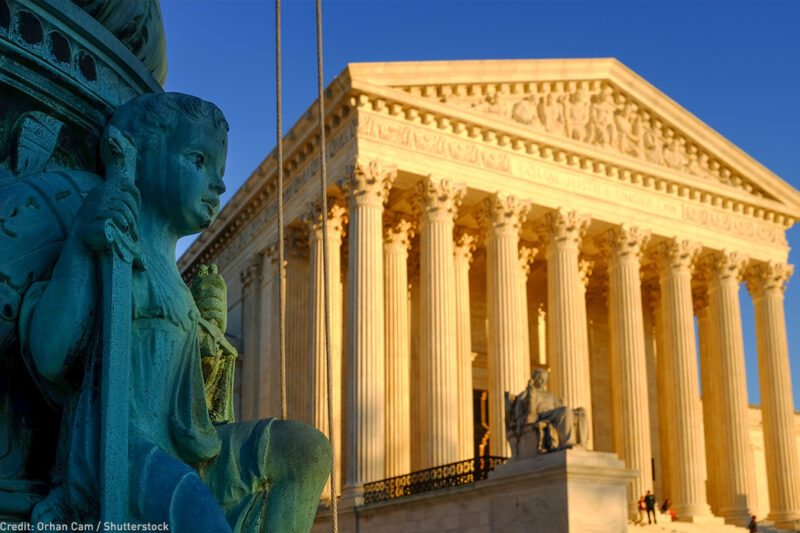The Masterpiece Cakeshop Supreme Court Case Is One Piece of a Much Larger Attack on LGBTQ Lives


This term the Supreme Court will hear a case, Masterpiece Cakeshop, Ltd. v. Charlie Craig & David Mullins, involving a Colorado bakery that refused to serve a same-sex couple who wanted to purchase a cake for their wedding reception.
Colorado law prohibits discrimination in places of public accommodations — places like bakeries, movie theatres, restaurants, hospitals, and other establishments open to the public — based on sexual orientation, among other protected classes. The Colorado courts, interpreting this straightforward law, held that the bakery’s refusal to serve the couple constituted discrimination based on sexual orientation and that there is no constitutional right to discriminate that supersedes this protection.
Now before the United States Supreme Court and supported by anti-LGBTQ groups, and the United States Department of Justice, the bakery argues that it has a First Amendment right to discriminate based on the owner’s religious beliefs. The owner also claims that because his business — making cakes — involves some creativity, he should be allowed to determine who can receive his services.
His argument can be deceptively appealing. Cakes can often have artistic or creative designs. So can sandwiches, legal briefs, bicycles, cars, flowers, medical care. Indeed, the work that we do often has great personal meaning to us and reflects our skill and passion.
But it is wrong to think that (1) any business that involves a creative component should be exempt from nondiscrimination laws, or (2) that a business is somehow endorsing each and every customer it serves.
As civil rights attorney Mary Bonauto wrote in a recent piece for :
Earning a living from the sweat of one’s brow coexists with human creativity, with the passion for cutting hair or cooking food, with designing and sewing clothing – with making something both functional and beautiful. Uplifting the dignity and creativity in all work, Dr. Martin Luther King spoke of the “street sweeper” who could “sweep streets like Michelangelo painted pictures; sweep streets like Handel and Beethoven composed music; sweep streets like Shakespeare wrote poetry.”
To argue, as do Masterpiece Cakeshop and the Department of Justice in this case, that the exemption that would be created by a ruling for the business is narrow, is to ignore that reality. If we start to exempt from nondiscrimination laws businesses that reflect creativity and passion, such a move would undermine all nondiscrimination protections.
Alliance Defending Freedom (ADF), the organization defending the business at the Supreme Court, is taking great pains to frame this case as one about art and expression. It is using this tactic to gain support and obscure the fact that this case is part of a broader strategy to banish LGBTQ people from public life.
This is not about cake. This is about demolishing the legal protections that exist against discrimination in places of public accommodation.
Groups like ADF have already seeking to exempt from nondiscrimination protections any action that infringes upon an individual or businesses deeply held religious or moral belief that: “(a) Marriage is or should be recognized as the union of one man and one woman; (b) Sexual relations are properly reserved to such a marriage; and (c) Male (man) or female (woman) refer to an individual's immutable biological sex as objectively determined by anatomy and genetics at time of birth.”
I shudder at this final point since it means a moral or religious belief that trans people do not exist. And that is precisely what ADF and others have argued time and time again in litigation.
In the past two years, they and others have advanced the arguments that it is “” for the federal government to protect transgender students from discrimination, that having a gender that does not accord with the gender assigned to a person at birth is a “,” and that providing health insurance coverage for gender transition would amount to “material cooperation with evil.”
If the Supreme Court sides with the bakery, the systematic rejection of LGBTQ people from public life will gain legitimacy and anti-LGBTQ movements will grow stronger.
It is possible to value creative labor and religious liberty without gutting generally applicable legal protections against discrimination and opening the door to a world in which trans people are rejected from public life because people don’t believe we do or should exist.
If a baker can reject LGBTQ people because of who we are, then what about the mechanic, the florist, the doctor, the teacher? This is not about cake. This is not about art. This is about survival.

